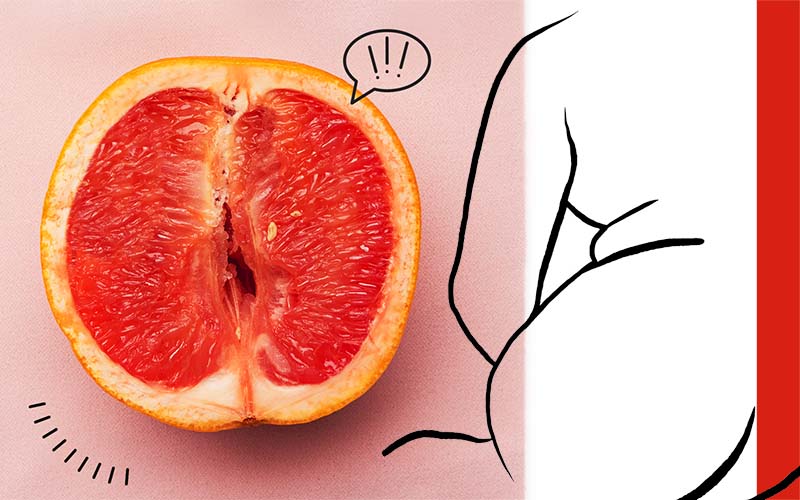Short answer: You can’t. But you can try!
While queefing, aka the sound or feeling of air escaping your vagina, is often lumped in with farting, they are two entirely different beasts. A queef is not a fart! For starters, farts are gas coming out of your butt, whereas a queef refers to the lil sound of air rushing out of your vagina. While the two poofs share some commonalities (they make similar sounds, both come out of the same general undercarriage region of your bod), they’re totally different.
“A queef is an odorless trapped air pocket that has nothing to do with your diet,” explains Tamika K. Cross, MD, FACOG, a board-certified ob-gyn based in Houston. On the other hand, Dr. Cross explains that a fart typically has an odor and can be a response to various things in your diet, such as beans, dairy, etc., and bacteria breakdown during digestion.
Queefs happen when air is pushed into and trapped in the vaginal canal, Dr. Cross says. Certain movements (e.g., sex) can expel the trapped air in a forceful, sometimes audible manner, she adds. Queefs can also happen whether you’re solo or with a partner; when your legs are spread-eagle; or with fingers, toys, or penetration with a penis, Dr. Cross adds.
No matter how much you remind yourself that queefs are beyond your control (ya can’t hold one in the same way you can a fart), there are some things you can do to minimize or lessen your likelihood of queefing during sex. Remember, queefs happen to everyone with a vagina at some point or another—it’s just physics! But if you’re curious about how to reduce your likelihood of queefing during sex, here are some things to keep in mind:
There may be certain positions you can stay away from if you want to minimize queefing.
Avoiding your legs in the air or keeping your legs open for prolonged periods of time can help limit the amount of air getting in the vaginal canal, which causes queefs, explains Dr. Cross. Since queefs are just odorless air pockets, any positions that can lessen the chances of air getting in will help your cause. Another position to avoid here? Doggy-style, says Dr. Cross.
Know that you might just be more anatomically prone to queefing than other people with vaginas.
All bodies are different and that extends to your private parts. “Some women are more prone to queefing than others,” Dr. Cross says, depending on the shape and length of a woman’s vaginal canal. Vaginal lubrication also makes queefing more likely, so women with more naturally lubricated vaginas may tend to hear more queefing, she adds. This doesn’t mean you should try to keep your vagina desert-dry during sex in order to minimize your likelihood of queefing, as painful sex is not worth it.
You really shouldn’t be embarrassed or try to consciously attempt to avoid queefing—especially if you think you should be embarrassed because you’re worried about what your partner might think.
If you hate queefing because it takes you out of the moment and makes it harder for you to orgasm, by all means, give non-doggy-style positions more playtime in your sex life. But don’t spiral over queefing for the sake of your partner. “To be honest, I don’t think anyone needs to consciously attempt to ‘avoid’ it, as this is a very natural and common physiologic function,” says Dr. Cross.
If you do queef, just roll with it.
Seriously, you can’t control it, and you don’t need to make a big deal about it to you or your partner. “There is no need to excuse a queef,” says Dr. Cross. “It may be embarrassing, but honestly, it’s super common and many women have experienced it at some time or another. Don’t let it be a mood killer.” In fact, some men are even turned on by queefing, as they interpret it as a sign that they’re a better lover.
MORE INFO ON QUEEFING
Where queefs come from
While they sound uncannily like a fart, queefs aren’t that at all. Your smelliest smelly farts are the result of bacteria breaking down and being released as gas during the process of digestion and then escaping your bod in the form of a little toot.
But queefs don’t come from digestion, they just come from pockets of air sneaking out of your vagina in one quick burst.
“Queefs happen when air works its way into the vaginal canal and then escapes, sometimes making a farty toot-toot sound as it passes back out through the vaginal opening,” Vanessa Cullins, MD, vice president of external medical affairs at Planned Parenthood, told Cosmopolitan.com. “Queefs don’t smell because they’re caused by plain old air. They’re basically the vaginal version of making fart sounds with your mouth.”
So if you want, you can call queefs “vagina farts,” but know that it’s technically inaccurate. To-may-to, to-mah-to situation, sorta, but like toot-may-to, toot-mah-to.
When queefing happens
While it might seem like a queef escapes your vagina only during the most embarrassing times (like during a silent moment in yoga or during a quiet second during your foreplay), Dr. Cullins explains that they can just sort of happen whenever. “They are sometimes completely random,” she said. But! There are certain activities that put you more ~at risk~ for some good ol’ queefing.
“They’re especially common during sex because fingers, penises, or sex toys can easily push air up there,” Dr. Cullins said. “Your vagina also expands when you’re turned on, which makes more room for air. And vaginal moistness, which increases during sex, helps make that ‘poot poot poot’ sound.”
Because life is unfair and, frankly, we have very little control over our body’s functions, this does mean that, yes, your sexiest moments are also the moments when your vagina is most likely to let out a big fart sound. But there’s nothing abnormal about letting out a sputter of queefs every time you have sex—air is a gas, and the nature of gases is that they fill their containers. Sometimes that container just happens to be your cavernous vagina.
How to prevent a queef
According to Planned Parenthood, there’s nothing you can do to queef-proof your vag. But certain things—like rougher, more rigorous sex and lots of position changes—can up the risk.
You might also find that certain positions make you more queef-prone than others, like anything where your hips are raised above your head or your vagina is hoisted up in the air in any way. Rather than changing your sex life just to avoid a brief moment of potential embarrassment, just give your partner a heads-up that, uh, it might happen! Or don’t, and bond over laughing about it later. Truly, it’s totally normal and nothing to worry about.
How to recover from a queef
Oh, I wish I could give you expert advice on how to gracefully recover from an awkward moment during sex, but I really cannot. Dr. Cullins reassured that queefing is totally “normal and nothing to be embarrassed about.” But she also said there’s no surefire way to prevent them from happening. As of yet, there’s no queefing equivalent of Gas-X. Although the idea of being able to be “Queef-X” is sexy and intriguing.
“Here’s a little secret about sex: It’s kinda weird and messy and funny,” Dr. Cullins said. “There are smells. There are sounds. There are fluids. Sex is an intimate process that makes some of us feel pretty vulnerable, which is why it’s best to save it for someone who treats you with kindness and respect—like the kind of people who couldn’t care less how queefy your vagina is.”
So, sure, queefs are a bit embarrassing, but *sighs romantically* it’s the little farty toot-toots in relationships that lead to the kind of long-lasting love we all want. In the end, you just kinda have to accept that life’s a toot and queefs happen.













Leave A Comment